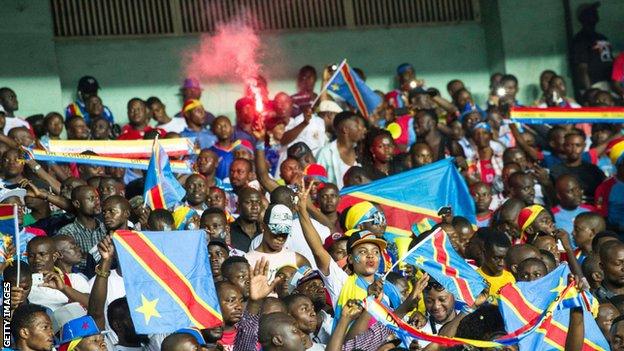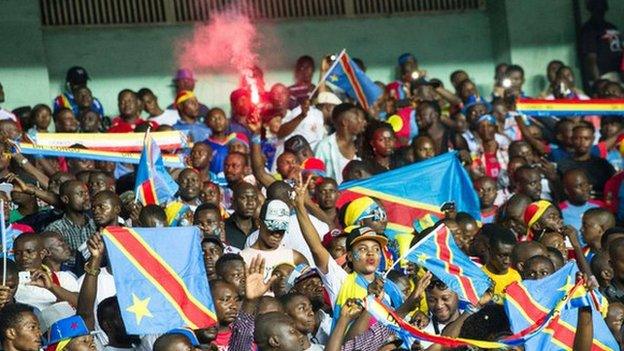Caf declines Liberia’s request to change venue for Afcon qualifier
- Published

DR Congo fans at the Stade des Martyrs in Kinshasa
The Confederation of African Football (Caf) has declined a request from the Liberia Football Association (LFA) to move Sunday's crucial Africa Cup of Nations qualifier away from the Democratic Republic of Congo.
The Group G fixture is scheduled for Kinshasa's Stade des Martyrs but Liberia want the venue moved away from DR Congo because of concerns over the Ebola epidemic.
Caf says it is monitoring the situation and that Kinshasa is safe to host the match as planned.
"According to reports, the virus is located very far from Kinshasa and there is no risk of organising the DR Congo versus Liberia match in the said venue as scheduled," said Caf's Director of Competitions, Samson Adamu, in an email to the LFA dated 17 March and seen by the BBC.
"Caf is in contact with [the] WHO (World Health Organisation) and is following the situation closely to ensure the organisation of the match in the best conditions."
Dr Soce Fall, the WHO's regional emergencies director told Caf: "To get from Kinshasa to North Kivu/Ituri where the Ebola epidemic is, you'd need to take two flights because of the distance. For WHO, there is no restriction to play the match in Kinshasa."
Any two of Group G's four teams, which also includes Zimbabwe and Congo Brazzaville, can still qualify for this year's finals in Egypt.
Group G after five matches: | |
|---|---|
Zimbabwe | 8 points |
Liberia | 7 points |
DR Congo | 6 points |
Congo | 5 point |
Despite their concerns, LFA secretary-general Isaac Montgomery has accepted Caf's latest decision.
"The delegation to Kinshasa leaves on Tuesday at 8:00AM local time [08:00GMT]. They will be joined by the overseas-based players ahead of the match on Sunday. And by his [God] grace, all will be well," Montgomery told BBC Sport on Monday.
In August 2014, Caf banned Liberia, Sierra Leone and Guinea from hosting international matches because of fears of spreading Ebola - eventually clearing the countries to restage matches in May 2015, December 2015 and January 2016 respectively.
According to the WHO, the most widespread Ebola outbreak in history began in Guinea in 2013 and killed more than 11,000 people - mainly in Guinea, Liberia and Sierra Leone.
- Published14 March 2019
